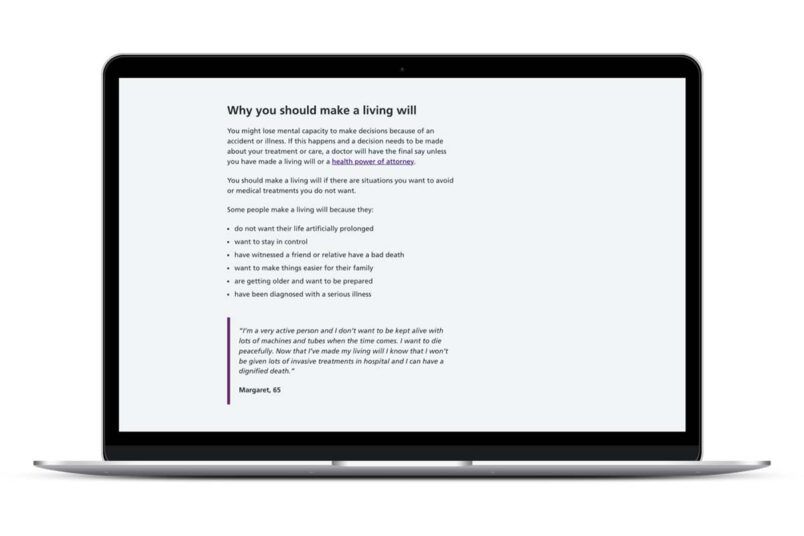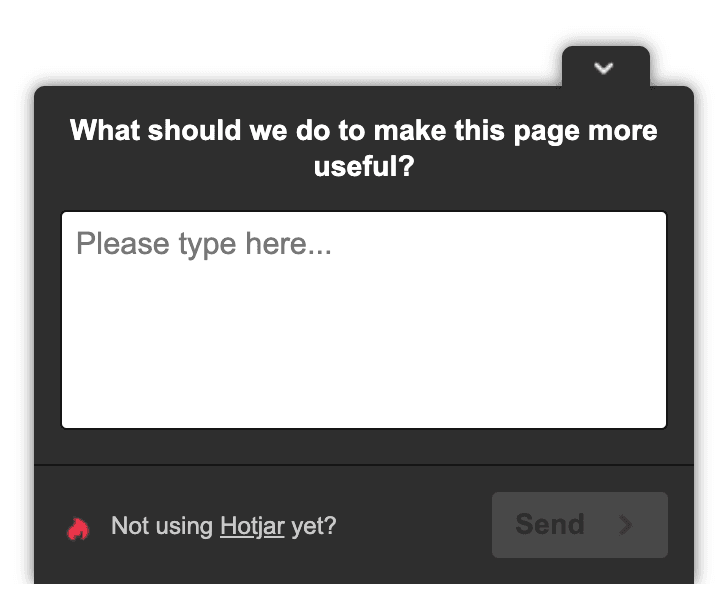
Why some people make a living will
When we were designing our new web content, our user research told us that lots of people came to our page on living wills (advance decisions) already knowing vaguely what they were.
People often come to us to check what they thought they knew was correct, and to then decide whether they are ready to start.
It’s this specific need and this particular mental model that we had in mind when we wrote this section of our new page on living wills:

There is also an organisational need reflected in this section — we want to promote the use of person-led tools because they are incredibly powerful in helping people get the care and treatment they want.
For most people, documenting their wishes for end-of-life care in a legally binding living will is a big decision. We want people to be sure they’ve got all the information they need before making that decision.
We’re all about personalised decision making — and we know people have their own individual reasons, experiences and motivations for wanting to complete a living will. So with that in mind we wanted to do some research to find out what made people visit our existing page — what was it that made our service users want to complete a living will?
Uncovering user needs through pop-up surveys
As part of our research, we set up an on-page pop-up survey on our existing living will pages. We asked people why they’d visited our pages — and after analysing their responses we saw some clear patterns.

Amongst the many reasons why people wanted to complete a living will, these six reasons tended to come up again and again…
People make a living will because they:
- do not want their life artificially prolonged
- want to stay in control
- have witnessed a friend or relative have a bad death
- want to make things easier for their family
- are getting older and want to be prepared
- have been diagnosed with a serious illness
So we had these reasons given directly to us from real users, and combined with our organisational need to promote the use of these forms, we thought it could work to simply list these reasons and frame the list as reasons why others decided to make a living will. We felt there was a distinction between us as an organisation telling people why they should make a living will, and reflecting the reasons other people had given as to why they’d done one.
We’re patient led, we’re not here to tell people what they should do — we’re here to listen, understand and give clear and honest information so they can decide for themselves.
This form of social proof was something we wanted to try and we wanted to take it into our usability testing to see how it worked.
We also wanted to try a different way of prompting people to consider making a living will by using a case study.
I’m a very active person and I don’t want to be kept alive with lots of machines and tubes when the time comes. I want to die peacefully. Now that I’ve made my living will I know that I won’t be given lots of invasive treatments in hospital and I can have a dignified death.
Margaret, 65
Based on learning from our information line, we created the composite case study above of ‘Margaret’ to represent a common user story of someone who has made a living will and describes the positive feeling it’s given her.
We wanted to see if this different type of content could work. We had a hypothesis that by positively framing the action we could highlight the peace of mind it gives someone. We wanted to test this slightly different approach of nudging someone towards the action.
Our usability testing
Six out of the seven users we tested this with said that their specific reason/s for wanting to make a living will were reflected in the above list. One user didn’t spot the section in our test, but when prompted their reason was covered by one of the reasons on the list anyway!
We had some useful feedback too — our third reason “have witnessed a friend or relative have a bad death” originally only mentioned relative but one user helpfully pointed out that often people have seen friends have bad experiences at the end of life, rather than limit this example to just relatives we used this helpful feedback.
Another person we tested the page with made an interesting comment — they were expecting to see dementia listed as an example in the list — indeed it was the reason they had given when asked what prompted them to make a living will.
This was really interesting for us as we know that dementia might be a reason many people decide to make a living will. The tricky thing for us was that by including dementia as the example of a serious illness, by definition by highlighting one condition you in a way demote others. We thought on balance it was better to keep the general “serious illness” rather than specify one.
We want to include and expand the scenarios in which people might consider making a living will. It’s an area of research we may want to re-visit though so watch this space.
Interestingly, the ‘Margaret’ case study didn’t come up in our testing — either users didn’t notice it or it wasn’t something that resonated as well as the bullet points of reasons. We don’t necessarily think this is a negative finding, rather we still think it has potential as a component because for those who didn’t didn’t notice the text, it didn’t affect them finding what they were looking for.
It could well be this case study works for 1 out of 5 people — and doesn’t negatively affect the other 4. In fact, when we tested our page on DNR forms the case study worked a treat so we might have a play around with the design and presentation to make it more prominent.
No wasted content
We wanted to share our thinking on this little section of our page because we want to show the work behind our content. We are convinced that making things open makes things better.
On first glance it’s a simple page, but there is a complexity and deep thinking behind every section, sentence and word. Deciding what bits to highlight, what order we use on the page — everything on this page has to fight for it’s right to be there!
The whole point is to make it as simple as possible for people. Death and dying are incredibly important but sometimes complex issues for people — our aim is to do some of the heavy lifting to try to make it a little easier.
If you’d like to talk about any of this work (or yours) then please get in touch — on email or on Twitter.